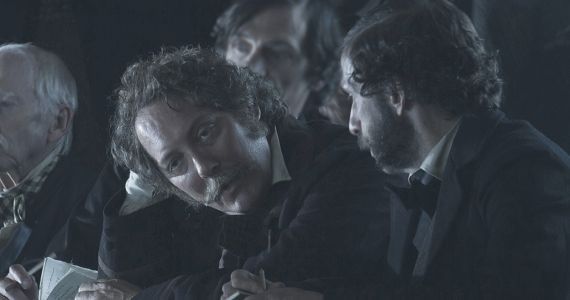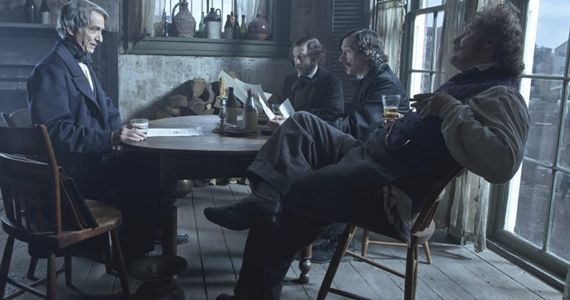When it comes to Steven Spielberg's Lincoln, it's not hard to understand why a lot of attention will inevitably be focused on star Daniel Day-Lewis' uncanny portrayal of the 16th president. However, those who have actually seen the film (read our review) will undoubtedly applaud the majority of the movie's talented acting ensemble.
One standout in the cast is James Spader (The Office, Boston Legal), who gives quite a memorable turn as 'W.N. Bilbo,' a character best described as the 19th century version of a political lobbyist; a man trying to sway delegates in the House of Representatives long before lobbying became the mainstream business it is today.
Thanks to Spader's portrayal, there's a good chance that Bilbo (a real-life figure) will soon be getting a much bigger Wikipedia entry. A lawyer/political angler working under the table for the Lincoln administration to sway members of the Democratic party to the side of the 13th Amendment, in Spader's hands, Bilbo is presented as a lovable rapscallion type, whose mischievous smile keeps one guessing where his morals and/or values lie - if anywhere besides the money in his pocket.
I had a chance to speak with Spader about the role, working with Spielberg, the large ensemble of actors, and the general experience of trying to tell the story of such a pivotal moment in U.S. history.
First, check out Spader in Lincoln:
Screen Rant: Your character - W.N. Bilbo - is best described as a kind of 19th century lobbyist. Given how we understand the idea of lobbying today, can you talk a little bit about what it was like playing a lobbyist in that historic context?
James Spader: Well obviously [lobbying] wasn't institutionalized at that point - it was much more sort of slapdash and amateurish and by the seat of your pants - which is what we embraced wholly in the film [Laughs]. I remember when we were shooting the film in Richmond, '60 Minutes' did a profile about Jack Abramoff [a former lobbyist who faced corruption charges and imprisonment in the mid-2000s], and the dichotomy now between "K Street" [a metonym for the D.C. lobbying industry] and Washington... I think it was a very different business back then [laughs]. But that is what was endearing to me about that aspect of the film - that [lobbying] was bumbling and by the seat of its pants.
SR: Did you research the actual man extensively - or was this more a character of your own creation?
JS: Well, first of all, it's a character of ['Lincoln' screenwriter] Tony Kushner's creation to a certain degree. But there is a limited amount of research material available about him that I found, which was redundant with what Tony Kushner had already found on him. It was limited (to a certain degree) to correspondence between Bilbo and Secretary of State Seward at the time of the events depicted in the film, and a little bit of background material. Actually, the piece that I found...appeared to be a published thesis or something like that, but there was very little.
And considering the huge cast of the film - I think there are 140 speaking roles or something - they had images of a lot of characters, but they didn't have any of Bilbo. There were a couple of references to his appearance, but it was mainly that he was a snappy dresser, he loved sort of colorful waistcoats, or he had a certain amount of facial hair - I have no idea if he had a big bushy moustache like we chose to have in the film. But, you know, the less we knew about him the more creative license we had to have fun with him and have him serve what I think is an important purpose in the film - also bringing a certain amount of levity within the context of the picture.
One running theme in the film is this idea of each person having a moral/philosophical compass inside of them. One thing that's fun about Bilbo is that we are never sure, exactly, which way his compass points. He does what he's paid to do, but his moral values remain very ambiguous. Even if they aren't outright stated in the film, can you describe what kind of moral compass you fit Bilbo with when constructing the character?
You know, he was a very successful attorney in Nashville. He'd made a certain amount of money and accrued a certain amount of wealth from some land deals that he made down there - and there was actually a certain amount of background material in terms of that, and coal country, and that area. He was spoken of as if he was a fairly colorful figure, and he had a very colorful life - which is not depicted in the film - but there were certain things we did find in research. For instance, he was arrested at one point in New York state as a suspected confederate spy, and he had to prevail upon Seward - and Seward then had to prevail upon Lincoln - to advocate for him and his release, since he had a working relationship with the administration. But you know, he was somewhat enigmatic for us and we decided to sort of embrace that, and Tony already had in his screenplay.
In terms of his motivations: he was a member of the Whig Party - which was a precursor to the Republican Party - he had actually known Seward; the movie implies he was meeting Seward for the first time, but they had known each other prior to that, which is why he was approached. I think another thing we found in research was that he was a passionate Unionist; he felt very strongly about the preservation of the union. But one's stand in terms of morality with the subject at hand (which was the abolition of slavery) was something that - depending on who you were and where you were and what your life was - was a matter of degree. And I absolutely believe that he was fighting for the cause, but I would not venture to say by what degree he was driven by a passion for abolition. I don't know that. I do not know that.
But, at that time, [abolition] was something that many were very ambivalent about. I mean Thaddeus Stevens (Tommy Lee Jones) was not ambivalent about it - and there were certainly radical Republicans and a lot of people in this country who were not ambivalent about it - but LINCOLN was ambivalent; Lincoln was struggling with what this meant. He knew that he believed very strongly that slavery should be abolished - he took our country to war about that - but in terms of race-relations, what that meant to the country, what its far-reaching implications were... that was a mystery to him. And what the aftermath of that act was... [Lincoln] was obviously committed to the idea that the staggering amount of deaths that were piling up every day - every year during the course of the four years prior to [events in the film] - those deaths absolutely required the value that the abolition of slavery would provide. I think I've circled your question successfully [Laughs].
In every scene you're in, it looked like you and your partners in crime - John Hawkes and Tim Blake Nelson - are having a lot of fun together. Can you talk about forming the tight chemistry you guys have in the film?
We had a great time. I couldn't imagine having more fun than I did on this film, it was an absolute delight. And Tim and John were just wonderful to work with - just delightful to work with. We had fun doing it, but we were also all very aware from the first read of the script that [that camaraderie] was part of the job description of these characters - we had to embrace that aspect of it. Because I think that was something that was important, the tonal aspect of our scenes within the greater context of the film as a whole.
What was it like seeing Daniel Day-Lewis on set as Lincoln full-time? I think that in a weird way, his depiction could become our collective association with who Lincoln is, even though this a fictional representation.
When I'm on the set working with another actor I'm doing everything I can to suspend belief about myself and about everybody I'm working with, to try an immerse yourself in that moment. I find that every great actor does that - and so I aspire to that and I think that any actor aspires to that. And the more adept that any actor is at immersing themselves in the moment of that scene, it makes it easier for everyone around them. And in this film, Steven Spielberg compiled a group of people who are all very adapt at immersing themselves in the moment that is unfolding in the course of a scene - and then, unfolding in the course of the movie as a whole. But I never lose sense of the fact that I'm making film! I never lose sense of the fact that I'm working with a room full of actors and camera people and lighting people and hair, makeup and costume people. There are a lot of people running around the set! Especially on this one [Laughs]!
Quick final question: Will you be shooting anything for the final season of The Office?
Oh, I have not had any conversations about doing anything with The Office this year. I think Robert California is off traveling around the world with a bunch of gymnasts right now.
-
[poll id="440"]
-
Watch James Spader bribe and coerce America towards the path of abolition as W.N. Bilbo in Lincoln, which hits theaters in wide release on November 16, 2012. And be sure to read our Lincoln review.


